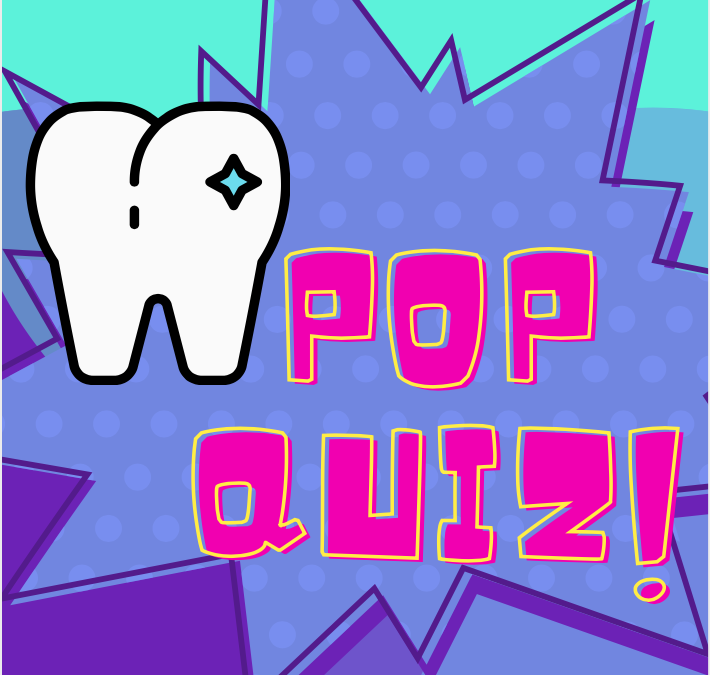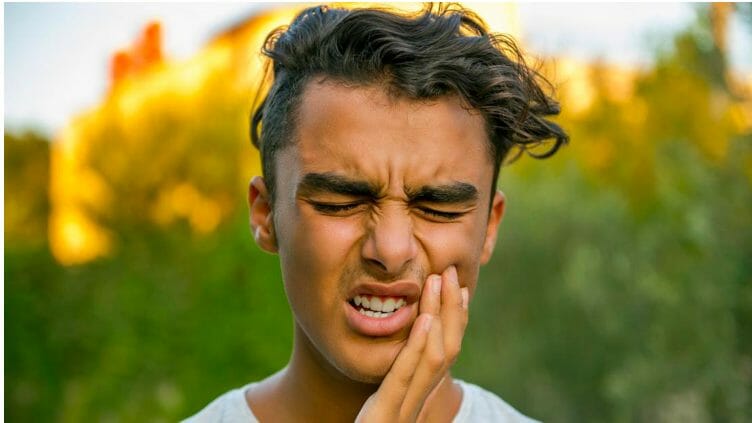Mar 23, 2021

*Image courtesy of www.thespruce.com
Even though there may still be snow on the ground in Maine when you read this, Spring is just around the corner! With each wonderous bulb that pops up, Spring brings the promise of renewal and growth. Why not apply the spirit of Spring to your smile? Cosmetic procedures can rejuvenate your teeth and give you the smile of your dreams! We offer a variety of options for patients looking to brighten, whiten, or fix their teeth, many of which can be accomplished in as little as one or two appointments. Here are 5 ways we can help you improve your smile:
Porcelain Veneers
If you have chipped, worn, or stained teeth, porcelain veneers can provide a sleek and attractive option for changing their shape, color, and length. Veneers are ultra-thin porcelain shells that are shaped and fixed to your natural teeth, and can be custom fitted to your teeth in just two short visits. They look and feel just like your other teeth, and don’t require special or additional care.
If the condition or color of your teeth has been detracting from your everyday life, porcelain veneers may be the perfect solution for you. Have a short conversation with Dr. Brunacini or Dr. Karagiorgos to learn more!
Teeth Whitening
Teeth whitening is one of the most well known cosmetic treatments, and we offer both in-office whitening and at-home options. Teeth whitening is a safe way to achieve the bright smile you’ve always wanted, and can be done in just a few treatments. However, whitening is not for everyone. For example, whitening previously restored teeth, especially in the front part of the mouth, can make the fillings more noticeable, since the enamel will whiten while the fillings resist the bleach. Also, bleaching can also be uncomfortable if you have sensitive teeth. Dr. Brunacini or Dr. Karagiorgos can work with you to determine if bleaching is right for your teeth.
Dental Bonding
Small chips and discolorations in your teeth are often unnoticeable to others, but we understand that seeing the same stains and fractures everyday can become a significant irritation. Dental bonding is an affordable and painless procedure that can address many different cosmetic flaws or injuries, by smoothing out or repairing damaged teeth. We use dental bonding to sculpt individual teeth with a special tooth-like material that looks, acts, and feels like the real thing. Bonding can also be completed very quickly, as the composite resin adheres quickly to your teeth and can then be polished and shaped to match your other teeth. This is a great option for a lot of our patients!
Dental Implants
If you have missing teeth, there may be a better solution for you than wearing uncomfortable dentures. Many people believe that if they can still eat, then tooth loss isn’t an issue; however, missing teeth leads to a loss of support in the mouth and forces other healthy teeth to drift. Dental implants provide a great long-term option for replacing lost teeth in a safe and predictable way, as they are designed to last a lifetime.
You may be better suited for implants than you realize as your general health is a better indicator than your age. We aim to make every process as comfortable and safe as possible, and we can help you to determine whether implants are the right choice for you.
Invisalign
Did you put off getting braces when you were younger? Do you notice changes in the way your teeth fit together?
Falmouth Dental Arts can help you correct crooked teeth, gaps, overbites, or other bite issues with Invisalign treatment. Invisalign can be a great alternative to traditional wired braces. More than simply giving you a straighter smile, Invisalign can also enhance your ability to chew and even alleviate some speech impediments. Straighter teeth are also easier to clean and give many people some added confidence behind their smile.
There are several clear tray straightening products. Invisalign is the one we recommend and use at Falmouth Dental Arts. Using the world’s most advanced clear aligning process, Invisalign can start transforming your smile from the first fitting!
If you want to rejuvenate your smile and have any questions about if a cosmetic procedure is the right option for you, please give us a call at 207.781.5900! We are your partner in oral health care and love to help patients have a healthy, beautiful smile!

Dec 27, 2020
It’s the most wonderful time of the year…to give back! Healthy smiles are one of the best gifts, and we believe that everyone should have access to oral health care. That’s why we work with Dental Lifeline and Dancing with the Dentists to help people in our community receive the dental care they need. If you haven’t heard of these two wonderful organizations, let us help you learn more about great work being done in oral health!
Dental Lifeline is a national charitable organization that was founded in 1974. Its mission is to improve the oral health of people with disabilities or who are elderly or medically fragile. Through its flagship program, Donated Dental Services (DDS), oral care is provided to people who cannot afford necessary treatments and cannot receive public aid. With its network of 15,000 dentists and 3,500 labs nationwide, the DDS program has provided $378 million in donated therapies and transformed the lives of 120,550 people.
Our beloved Dr. Knock envisioned Dancing with the Dentists and drew from his local dental network to build a ballroom dancing competition that generated funds for several local charities. Our very own Dr. Brunacini and his wife, Jenny, won the coveted Mirror Ball Trophy in Season 1! Dancing with the Dentists Season 4 will take place in 2022, and will feature 10 courageous dental professionals on the ballroom floor, showing off their moves to raise money for The Root Cellar and Dental Lifeline. A fun competition that also makes a real impact, Dancing with the Dentists raised over $40,000 for charity at their last event!
We have also worked with Dentists Who Care for ME and look forward to continuing to support their great work when they are able to hold the next event for their services.
Giving back and caring about our community has never felt more important. 2020 has been full of challenges, to say the least. This holiday season, we also look forward to supporting our local business community. As a locally-owned small business, we feel grateful to be a part of such a conscientious and kind community. We’re all in this together!
We wish you a wonderful and safe holiday season! Thank you for being a part of the FDA Family!
*Image courtesy of www.shutterstock.com

Dec 27, 2020
Welcome to Dental Health 101! Educating our patients is one of our top priorities at FDA, and we thought it would be fun to test your knowledge of some oral health care basics with a pop quiz! Relax, this won’t impact your final grade. ???? So, grab your extra-sharp No.2 pencils and see if you pass the FDA Basic Dental Health Pop Quiz!
1.When should you bring your child to the dentist for the first time?
A. Between the age of 1 to 3
B. When they lose their first tooth
C. If they have yellow teeth
Answer: A – We recommend you start bringing your children around the age of 1 to 3 to start their dental care. As soon as your child has teeth, they can get cavities and it is helpful to be proactive about oral health care. Each child is different as to when they are ready and our goal is to make coming to the dentist a positive experience for them. Our compassionate team is here to help you start a lifetime of healthy habits for your kids. If you need tips for getting your kids to brush, give us a call!
2. True or False: Dental enamel is the hardest substance in the human body.
Answer: True! It is even harder than bone! A highly resilient surface, it is 96% mineral which makes it extremely durable, lasting hundreds of years. Despite its toughness, enamel can still chip or crack. Take care of tooth enamel and prevent tooth decay by brushing twice-a-day and flossing daily. If a chip happens your tooth enamel can’t repair itself, so come see Dr. Brunacini or Dr. Karagiorgos to talk about your options for repair or restoration.
3. How long should I brush my teeth?
A. 45 seconds
B. 2 minutes
C. 90 seconds
Answer: B – Brush your teeth for 2 minutes, twice-a-day. While the average American only brushes their teeth for about 45 seconds, give your teeth the extra love they need to help reduce plaque and maintain your gum health. Many electric toothbrushes have a built-in timer that automatically shuts off after two minutes…how easy is that?! Brushing your teeth for two minutes twice-a-day, along with daily flossing, regular dental check-ups, and a healthy diet is the basic recipe for a healthy mouth and a healthy life!
4. True or False: A healthy diet can impact your oral health.
Answer: True! A diet rich in vegetables, high-calcium dairy products, protein, and omega-3s, not only keeps your body healthy, but helps your mouth stay healthy, too! Those crisp fruits and veggies help stimulate saliva to keep your teeth clean…kind of like brushing your teeth. Foods rich in calcium and vitamin D help maintain a strong tooth structure, while those omega-3s contribute to a healthy inflammatory response in your body. When you nourish your body, you also support your oral health…so load up your plate with leafy greens, nuts, crunchy veggies, fish, and dairy products. We’re always happy to share healthy tips, so feel free to ask us about what food to incorporate into your diet for improved oral health at your next appointment!
5. For optimal cleaning, brush your teeth:
A. Like you’re scrubbing a toilet
B. Like you’re scraping paint
C. Like you’re massaging a friend
Answer: C – You can brush your teeth too hard: over-brushing your teeth with a stiff-bristled brush or with a lot of force you can damage your tooth enamel and erode your gums. Treat your teeth and gums with care and take a more gentle approach with your pearly whites. Look for an extra soft-bristled brush with the ADA “Seal of Approval” and gently brush at a 45-degree angle so you clean your teeth and massage your gums without causing damage.
How did your dental health knowledge stack up? Whether you aced this quiz or bombed it, please know that FDA is always here to answer your questions and show you the best dental care techniques. We are your partners in your oral health and strive to empower you with knowledge so together we create a customized course of treatment that works for you. Call us at 207.781.5900 with questions or to schedule your next appointment!

Dec 27, 2020
When was the last time you checked in with your jaw? In these stressful times, perhaps you’ve noticed that you clench or grind your teeth more frequently, or that your jaw has begun to pop as you chew or talk. While occasional grinding or clenching may not be harmful, regular grinding can cause damage to your teeth and impact your jaws and joints. Sounds scary! However, you’re not alone! Some 30 to 40% of Americans have jaw pain or grind their teeth. Talking to Dr. Brunacini or Dr. Karagiorgos is a great first step to addressing the aches in your jaw and face. Here are some symptoms to look out for and some tips to keep your jaw from causing you pain.
Teeth grinding, also known as bruxism, often happens at night while you sleep. Even if you’re not aware of grinding and clenching your teeth, you’re probably experiencing some symptoms in the daylight hours. Here are a few common symptoms:
- Dull headache
- Sore jaw, neck, or face muscles
- Popping or cracking when moving jaw
- Tooth pain or sensitivity
- Chipped or flattened teeth
There are steps you can take to stop grinding your teeth and Dr. Brunacini or Dr. Karagiorgos should be part of your plan. If you feel like you have been experiencing any of the symptoms listed above, come in for a comprehensive dental exam so we can help develop a special treatment plan for you. For example, we can prescribe and fabricate a night guard to help protect your teeth. We can also help you address your stress, as well as find resources and support for relaxing your mind and your jaw muscles. Some tips to consider include:
- Exercise for whole body health and stress reduction
- Counseling to help with stress and anxiety
- Warm compresses to help ease jaw tension
- Jaw exercises to help relax the muscles before bedtime
So, remember to brush your teeth, floss, and relax your jaw! If you need help addressing your jaw pain or teeth grinding, give us a call at 207.781.5900. We are here to help you have dental care that treats you and helps you have a healthy mouth and a healthy life!

Dec 25, 2020
“Home for the Holidays” has a whole new meaning this year. Many of us are recalibrating our holiday celebrations to keep our loved ones and community safe. In the midst of all this change, let’s not forget our dental health commitment! To keep it simple for you, we put together our top 5 tips for keeping your teeth healthy and treating yourself right this holiday season.
1. Treat yourself to a new toothbrush!
When was the last time you replaced your toothbrush? We (and the ADA!) recommend you replace your toothbrush every three to four months or when the bristles become frayed. It’s also important to replace your toothbrush after an illness to ensure you don’t spread more germs. Our hygienists are fans of electric toothbrushes for top-notch brushing and frequently recommend them to patients. Sounds like the perfect stocking stuffer!
2. Treat your teeth and gums to a massage!
We’ve talked about this on our blog before, but it’s actually possible to brush too hard. Putting more elbow grease into your two minutes, twice-a-day doesn’t mean you’re doing a better job keeping your mouth healthy…in fact you could be damaging your tooth enamel or gums. Be gentle with your teeth and brush like you are giving them a nice massage. Find your moment of zen while you brush and your mouth will thank you!
3. Treat your whole body right!
Good oral health care doesn’t stop at the bathroom sink. It’s also important to incorporate a healthy diet and healthy habits into your oral health care regimen. The holidays are full of tempting sweets and goodies, but you’ll be treating your body and your teeth right when you make an effort to incorporate some crunchy veggies or fruit into your holiday nibbling. From leafy greens to carrots to apples, there are a lot of healthy snacks out there that help support a healthy mouth. Also, cheese lovers will rejoice to learn that they are supporting their teeth with a serving of calcium and Vitamin D!
4. Treat yourself to a new habit…flossing!
Get a jump start on the new year by adopting a new healthy habit that will support your oral health and your whole body: flossing! We probably don’t need to tell you again that flossing is not only a crucial part of your dental care but that it has also been linked to improving health conditions such as diabetes. There are other options for cleaning between your teeth beyond just traditional flossing, so you can figure out what works best for you. It doesn’t matter when you floss each day, just do it!
5. Treat yourself to a dental checkup with our compassionate team of dental professionals who care about you!
We are your partners in oral health and want to provide you with the absolute best oral health care possible. If you have put off your routine check up due to concerns about the virus, please call us at 207.781.5900. We can discuss your concerns and describe our health screening and COVID-19 protocols that are in place to protect both you as our patient and us as your provider.
Happy Holidays from our FDA family to yours! Stay safe and stay healthy!

Nov 27, 2020
Did you know that saliva is the mouth’s primary defense against tooth decay? We speak the truth…saliva is a really big deal! Saliva helps wash away food, fortify your teeth with minerals, and neutralize acids produced by bacteria in the mouth. It is crucial to your oral health, which is why if you experience dry mouth, Dr. Brunacini and Dr. Karagiorgos want to know. Dry mouth, also known xerostomia, can be a symptom of another medical issue or a side effect of certain medications. It can be a particular issue for patients over 60. So, what causes dry mouth? And what are the complications that can result from it? Let’s take a closer look:
Causes of Dry Mouth
Dry mouth is not a disease, but can be a symptom of other medical conditions. One example is Sjogren’s Syndrome, a chronic autoimmune disorder in which the body’s immune system mistakenly attacks its own moisture producing glands. Other conditions that can cause dry mouth include rheumatoid arthritis, lupus, and cystic fibrosis. Hormonal changes in the body like women experience during pregnancy and menopause can also impact saliva production. Dr. Brunacini and Dr. Karagiorgos are part of your health care team, and if you have a medical condition that impacts your saliva or mouth, it is helpful to keep us in the loop. Share your medical history with us so we can help you be proactive about your symptoms and your oral health.
Along with your medical history, it is also important to share what medications you take with Dr. Bruncini and Dr. Karagiorgos. Certain medications can have dry mouth as a side effect. These medications can range from chemotherapy to antidepressants to over-the-counter antihistamines. Dry mouth is one of the most common adverse side effects and fortunately there are options to help restore moisture to your mouth. Sharing your medication list with us helps us know all the factors contributing to your oral health so we can help design a treatment plan that is right for you.
Complications of Dry Mouth
It can be uncomfortable to experience dry mouth and problematic to your dental health. You may experience complications such as a sore throat, trouble speaking, difficulty chewing and swallowing, or notice that your saliva feels sticky and that you have bad breath. Mouth sores and yeast infections are other complications that may arise. If you wear dentures, you may experience issues with their fit and comfort without proper saliva production. Your mouth will also be exposed to more bacteria which puts you at a higher risk for tooth decay and gum disease.
Don’t worry, if you’re experiencing some of the discomfort associated with dry mouth, we can help! Talk to Dr. Brunacini, Dr. Karagiorgos, or your hygienist. We will have tips and recommendations to help you find relief while you care for your teeth and mouth. For example, we can help you find a sugar-free gum to stimulate saliva and restore moisture, or steer you towards oral rinses that will replace moisture. As always, remember to keep brushing twice a day and flossing once a day! If you have more questions or concerns about your oral health or would like to schedule an appointment or consultation, give us a call at 207.781.5900.
**Image courtesy of www.thedoctorweighsin.com






